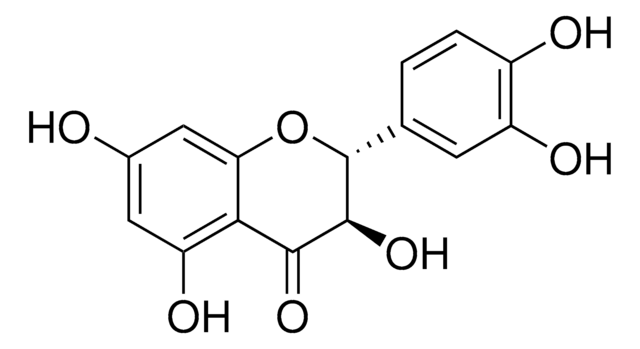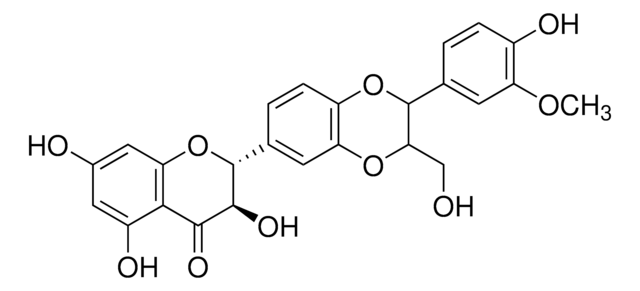S0292
Silymarin
flavonolignans
Synonym(s):
flavolignans
Sign Into View Organizational & Contract Pricing
All Photos(1)
About This Item
Recommended Products
biological source
plant (Silybum marianum)
Quality Level
form
powder
technique(s)
toxicology assay: suitable
application(s)
microbiology
storage temp.
−20°C
SMILES string
O1C(C(Oc3c1ccc(c3)C4Oc5c(c(cc(c5)O)O)C(=O)C4O)c2cc(c(cc2)O)OC)CO
InChI
1S/C25H22O10/c1-32-17-6-11(2-4-14(17)28)24-20(10-26)33-16-5-3-12(7-18(16)34-24)25-23(31)22(30)21-15(29)8-13(27)9-19(21)35-25/h2-9,20,23-29,31H,10H2,1H3
InChI key
SEBFKMXJBCUCAI-UHFFFAOYSA-N
General description
Silymarin is a flavonolignan, obtained from milk thistle (Silybum marianum) plant.
Application
Silymarin has been used to study:
- its in vitro antiviral, antibacterial, antifungal activities and cytotoxicity
- its effect of silymarin on bladder contractions in cyclophosphamide (CYP)-induced cystitis rat model
- its effect on liver toxication induced by Fumonisin B1 in mice
Biochem/physiol Actions
Silymarin is originally known to protect liver from various toxic agents and is used in treating hepatitis and cirrhosis. Silymarin possesses many biological actions such as antifibrotic, anti-lipid peroxidative, anti-inflammatory, immunomodulatory and membrane stabilizing. Silymarin also aids in liver regeneration.
Silymarin provides cardioprotective activity against ischemia-reperfusion induced myocardial infarction in rats.
Silymarin was shown to protect the liver from the cytotoxic effects of anti-tuberculosis drugs by decreasing serum alanine aminotransferase (ALT), aspartate aminotransferase (AST) and alkaline phosphatase (ALP) levels. This effect was related to the anti-oxidant effects of silymarin.
Other Notes
Mixture of anti-hepatotoxic flavonolignans from the fruit of Silybum marianum.
Storage Class Code
11 - Combustible Solids
WGK
WGK 3
Flash Point(F)
Not applicable
Flash Point(C)
Not applicable
Personal Protective Equipment
dust mask type N95 (US), Eyeshields, Gloves
Choose from one of the most recent versions:
Already Own This Product?
Find documentation for the products that you have recently purchased in the Document Library.
Customers Also Viewed
Silymarin protects liver against toxic effects of anti-tuberculosis drugs in experimental animals.
Eminzade, S.
Nutrition & Metabolism, 5, 18-18 (2008)
Effect of silymarin on bladder overactivity in cyclophosphamide-induced cystitis rat model
Eser N, et al.
Phytomedicine, 19(8-9), 840-845 (2012)
Sirajudheen Anwar et al.
Indian journal of pharmacology, 50(3), 108-115 (2018-09-01)
Silymarin, extracted from the seeds of Silybum marianum L. (Milk thistle), is traditionally used for treating various illnesses such as diabetes, cancer, inflammation, hepatitis, liver cirrhosis, and renal problems. Acute cytotoxicity and genotoxicity studies have been reported with ambiguous outcomes;
Vieri Piazzini et al.
Molecules (Basel, Switzerland), 24(9) (2019-05-06)
Two novel nanomicellar formulations were developed to improve the poor aqueous solubility and the oral absorption of silymarin. Polymeric nanomicelles made of Soluplus and mixed nanomicelles combining Soluplus with d-α-tocopherol polyethylene glycol 1000 succinate (vitamin E TPGS) were prepared using
Chun-Ping Lu et al.
Chemico-biological interactions, 290, 12-18 (2018-05-14)
Macrophages and inflammasome pathway are involved in high-glucose toxicity and development of insulin resistance. Silymarin (SMR) was known to modulate glucose homeostasis and reduce inflammation. However, it is still unknown whether SMR possess anti-hyperglycemic effects in diabetic-like knockout mice (Hnf-1αkin/-/Ins.cre
Our team of scientists has experience in all areas of research including Life Science, Material Science, Chemical Synthesis, Chromatography, Analytical and many others.
Contact Technical Service





